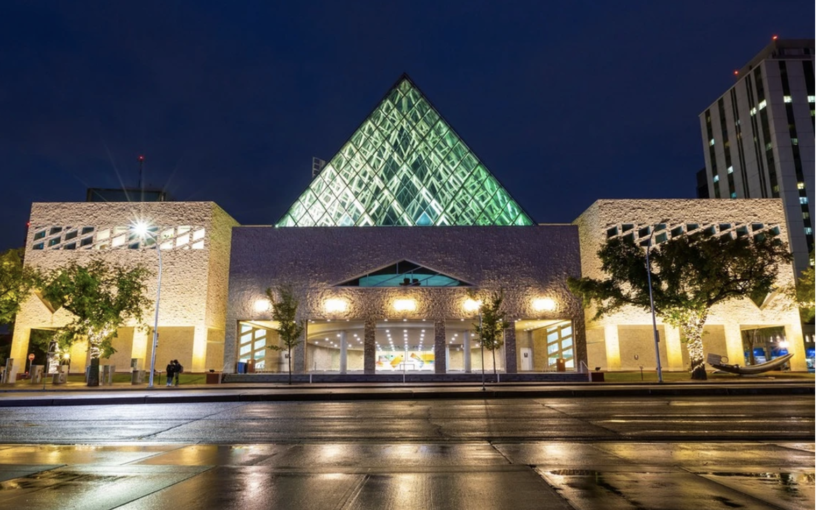
Protesters rallied outside city hall Tuesday to decry the police’s and University of Alberta’s handling of the pro-Palestine camp teardown before filling council chambers in a tense, but mostly quiet, display of displeasure.
More than 100 people joined in chants in Churchill Square over the noon hour in support of Palestine and for the students and others removed from the university’s encampment on Saturday. They yelled “Free, free Palestine” and “From the river to the sea Palestine will be free.” The group denounced the actions of the Edmonton Police Service and demanded the city reduce funding.
The group then moved indoors to attend council’s meeting at 1:30 p.m. and were met with a stronger security presence than usual. Representatives of the Edmonton Police Commission and Edmonton Police Service leadership were there to present the police’s annual report and face questions from city council.
Chambers were so full that security turned people away. Around 100 people sat inside the main room while about 100 more stayed in the atrium where a livestream of the meeting was broadcast for visitors.
‘We’re not a threat’
The camp’s removal has sparked debate around free expression on university campuses, with concern from local organizers around tactics they say police used on attendees including batons and pepper bullets, some of which is captured on video.

Former U of A student Brandon Robinson told Postmedia he was sent to the hospital because of injuries he sustained when police removed him from the camp, arrested him, and charged him with assault. He showed the cuts and scrapes on his hands, wrists and stomach.
Robinson told the crowd what happened inspired him to keep supporting the cause and the community.
“Why does the university seem to try to have to tear us down? We aren’t being violent or hateful. We’re not a threat to safety, we’re not stopping anyone from getting to class — this is a place for learning.”
Other protesters carried signs with messages calling for council to defund the police and targeting the U of A , saying “disclose, divest, demand.”

Heightened security
Tensions were also felt inside the building when the meeting resumed after lunch.
Security was noticeably elevated inside city hall. More than a dozen peace officers arrived just before the protest began, adding to the already increased number of guards that have been present at city hall daily since the shooting in January.
Postmedia obtained an email from council’s security office advising elected officials not to attend Tuesday’s meeting in person: “Site security and local law enforcement are aware of this gathering. For safety and/or security concerns, please consider joining the city council meeting virtually.”
Despite the warning, most councillors came to city hall. Councillors Sarah Hamilton, Aaron Paquette, Jennifer Rice and Karen Principe joined virtually. Several councillors, including those participating virtually and in person, asked tough and direct questions to the delegation of Edmonton Police Commission and EPS members.
Audience members interjected verbally or snapped their fingers in support multiple times to show support, or scoffed at responses they disliked despite repeated warnings from the mayor not to interject.
“Please, I will request again. Please listen to the questions and answers, please,” Mayor Amarjeet Sohi pleaded with the chamber after several requests to the gallery that they remain quiet.

Protesters interject
In one case, Ward Karhiio Coun. Keren Tang was asking questions as one person disrupted the meeting while leaving, yelling “Defund the police! Free Palestine!”
Mayor Sohi interjected “Excuse me. Excuse me,” and sighed, before Tang resumed. She asked if police do their own reviews around EPS’ control tactics for peaceful protests.
Commission spokesperson Matthew Barker responded that the commission doesn’t assess police actions but can ask questions about policy, and that EPS may do an internal review on top of a potential review by ASIRT requested by Premier Danielle Smith.
“In this particular incident, there will be some interest in policies and how they were in place,” Barker said.

The mayor followed up, saying whether there are policies that review how police respond to incidents is “a very important question” on the public’s mind because of what happened at the U of A.
“Whether it’s a reality or perception, people are thinking out there that the proportionality of the response differs from incident to incident, so I just want to know (about) the consistency of application of the policy, how you respond to those.”
Enyinnah Okere, EPS chief operations officer, asked the mayor to elaborate and offer more details. The mayor followed up, saying he’s receiving calls and hearing questions from the public about whether the use of force is applied consistently.
“The trouble we have is, this is a hypothetical,” Okere replied. “We respond to 600 incidents, so I don’t know which one folks are saying there is more (force) applied to.”
Deputy chief Devin Laforce told journalists after the meeting that how the protest was handled will be reviewed internally. Three people were arrested and charged, none of whom were students, he said.
Councillors also asked questions about various elements of EPS’ annual report, including why use of force statistics are not included this year, how the police aim to improve public trust, oversight, and violence on public transit and perceptions around safety.



